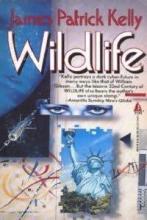Wildlife

Author
Genre
Subgenre
Language
English
Producer
Year
1993
Rating
Surely SF's loudest tempest in a teapot in the past 25 years was the so-called cyberpunk vs. humanist debate. Attention was paid when Bruce Sterling, editing the definitive cyberpunk anthology Mirrorshades , included ''Solstice'' by humanist writer Kelly. Wildlife , a fix-up novel which includes ''Solstice,'' a novella called ''Mr. Boy'' and two other sections, indicates that the battle is over and the winners are the readers. Kelly's novel deals with the effects artificial intelligence could have on society through the relationships of three generations of the Cage family. In the near future, journalist Wynne Cage witnesses (and abets) the theft of Wildlife--a computer program designed to create a cognizor, a human-equivalent AI--for a brilliant man in a decaying body. In ''Solstice'' (now changed from third to first person), Wynne's father Tony, muses on his relationship with his daughter, actually a female clone, ''a twin, except that we were carried to term in different wombs and her birth came some 28 years after mine.'' ''Mr. Boy'' is the only section that does not deal with some version of Wynne and seems too long, but Kelly ( Look into the Sun ) has combined the virtues claimed by the humanists with the technological possibilities that are the cornerstone of cyberpunk in a book that delves into the very core of what it means to be human. (Feb.)
When advances in computer technology and bioengineering come together in a spectacular computer program known as Wildlife, a young woman's future becomes irrevocably altered, and society is forced to redefine the meaning of ''human.'' Based on his Nebula Award-winning story, ''Mr. Boy,'' Kelly's extrapolation of the next two centuries' worth of scientific discoveries is both a gargantuan parody of the current rush toward hedonism and a grim look at the delicate balance between artificial and ''real'' intelligence. The author of Look into the Sun ( LJ 4/15/89) goes beyond cyberpunk in one imaginative leap. Most sf collections should have this title.
BookList - Carl Hays
One of the most imaginative stylists from the current clutch of cyberpunk-schooled sf specialists, Kelly here takes technological speculation to its creative limits with his strongest writing to date. Incorporating the recent Nebula-winning story Mr. Boy, Wildlife tells of Wynne Cage, a disillusioned video journalist whose struggle to escape her identity as a clone and reckless involvement with heisted experimental software eventually lead to her transformation into a series of immortal, computerized drones. Skillfully constructed from three different points of view, the story of Wynne's adventures begins with her introduction to the deformed but wealthy con artist who engineers the heist; moves back in time to highlight her famous father, a popular inventor of designer drugs; next, and years later, adopts the perspective of her perpetually youthful son, who encounters his biologically transformed mother as, among other things, a half-sized Statue of Liberty; and finally returns to Wynne's narration as she adopts a new, improved simulacrum of her original physique and reconciles with her cryogenically preserved father. A brilliant evocation of future possibilities that establishes Kelly as leading shaper of the genre.
When advances in computer technology and bioengineering come together in a spectacular computer program known as Wildlife, a young woman's future becomes irrevocably altered, and society is forced to redefine the meaning of ''human.'' Based on his Nebula Award-winning story, ''Mr. Boy,'' Kelly's extrapolation of the next two centuries' worth of scientific discoveries is both a gargantuan parody of the current rush toward hedonism and a grim look at the delicate balance between artificial and ''real'' intelligence. The author of Look into the Sun ( LJ 4/15/89) goes beyond cyberpunk in one imaginative leap. Most sf collections should have this title.
BookList - Carl Hays
One of the most imaginative stylists from the current clutch of cyberpunk-schooled sf specialists, Kelly here takes technological speculation to its creative limits with his strongest writing to date. Incorporating the recent Nebula-winning story Mr. Boy, Wildlife tells of Wynne Cage, a disillusioned video journalist whose struggle to escape her identity as a clone and reckless involvement with heisted experimental software eventually lead to her transformation into a series of immortal, computerized drones. Skillfully constructed from three different points of view, the story of Wynne's adventures begins with her introduction to the deformed but wealthy con artist who engineers the heist; moves back in time to highlight her famous father, a popular inventor of designer drugs; next, and years later, adopts the perspective of her perpetually youthful son, who encounters his biologically transformed mother as, among other things, a half-sized Statue of Liberty; and finally returns to Wynne's narration as she adopts a new, improved simulacrum of her original physique and reconciles with her cryogenically preserved father. A brilliant evocation of future possibilities that establishes Kelly as leading shaper of the genre.
 bookz 'n' thingz
bookz 'n' thingz